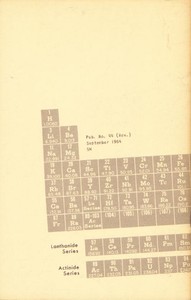A Brief History of Element Discovery, Synthesis, and Analysis by Glen W. Watson
"A Brief History of Element Discovery, Synthesis, and Analysis" by Glen W. Watson is a scientific publication written in the early 1960s. The book provides an overview of the historical evolution of chemical elements, detailing the advancements in the methods of discovering, synthesizing, and analyzing these substances. It discusses the transition from ancient concepts of elements to modern discoveries and theories in chemistry and nuclear physics. In this work, Watson chronicles the
journey of element discovery, starting with ancient theories proposed by Greek philosophers and leading to groundbreaking achievements in modern chemistry, particularly at the University of California's Radiation Laboratory. He highlights key figures such as Robert Boyle, Marie Curie, and Ernest Rutherford, illustrating how their contributions laid the groundwork for understanding elements and radioactivity. The book emphasizes the technological innovations that enabled the synthesis of new elements—such as cyclotrons—and the significance of isotopes and nuclear reactions in expanding the periodic table, particularly during the mid-20th century. Overall, Watson's narrative not only enriches our understanding of chemical science but also presents a fascinating timeline of human inquiry into the building blocks of matter. (This is an automatically generated summary.)
Read or download for free
| How to read | Url | Size | |||
|---|---|---|---|---|---|
| Read now! | https://www.gutenberg.org/ebooks/31624.html.images | 63 kB | |||
| EPUB3 (E-readers incl. Send-to-Kindle) | https://www.gutenberg.org/ebooks/31624.epub3.images | 1000 kB | |||
| EPUB (older E-readers) | https://www.gutenberg.org/ebooks/31624.epub.images | 996 kB | |||
| EPUB (no images, older E-readers) | https://www.gutenberg.org/ebooks/31624.epub.noimages | 267 kB | |||
| Kindle | https://www.gutenberg.org/ebooks/31624.kf8.images | 1.0 MB | |||
| older Kindles | https://www.gutenberg.org/ebooks/31624.kindle.images | 1.0 MB | |||
| Plain Text UTF-8 | https://www.gutenberg.org/ebooks/31624.txt.utf-8 | 53 kB | |||
| Download HTML (zip) | https://www.gutenberg.org/cache/epub/31624/pg31624-h.zip | 1.1 MB | |||
| There may be more files related to this item. | |||||
Similar Books
About this eBook
| Author | Watson, Glen W. |
|---|---|
| Title | A Brief History of Element Discovery, Synthesis, and Analysis |
| Note | Reading ease score: 50.3 (10th to 12th grade). Somewhat difficult to read. |
| Credits |
Produced by Mark C. Orton, Erica Pfister-Altschul and the Online Distributed Proofreading Team at http://www.pgdp.net |
| Language | English |
| LoC Class | QD: Science: Chemistry |
| Subject | Chemistry -- History |
| Subject | Chemical elements |
| Subject | Transuranium elements -- Synthesis |
| Category | Text |
| EBook-No. | 31624 |
| Release Date | Mar 13, 2010 |
| Copyright Status | Public domain in the USA. |
| Downloads | 298 downloads in the last 30 days. |
| Project Gutenberg eBooks are always free! | |

